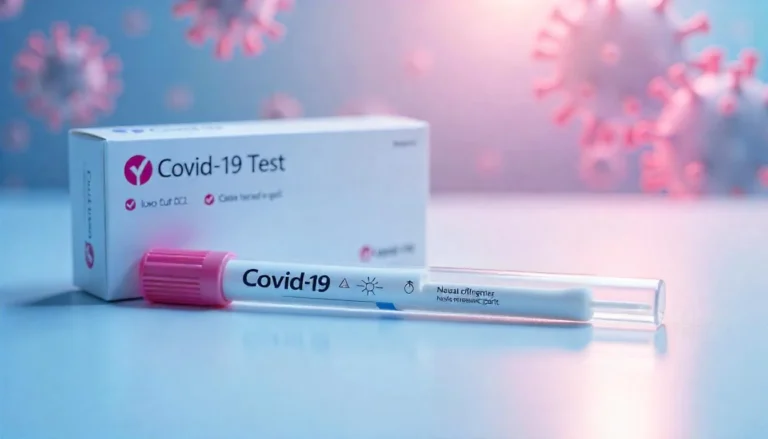When navigating the complexities of Covid-19, understanding how testing kits function can be reassuring. Covid test kits do not mistakenly detect other viruses. They are designed to identify the specific genetic markers of the Covid-19 virus using methods such as PCR and antigen testing. This focus guarantees that they differentiate Covid-19 from other common viruses.
For those looking to manage their health effectively, quick and convenient Covid testing kits available allow you to keep track of your health with ease. Reliable kits guarantee accurate results, alleviating concerns about confusing Covid-19 with other viruses like the flu or common cold. Advances in testing have been continually refined to maintain the accuracy needed in these necessary times.
Many test kits have emerged to meet the needs of individuals and healthcare providers. They offer diverse options, such as at-home packs, giving you flexibility and the ability to test easily. This accessibility means you can maintain awareness of your health without the need for frequent clinic visits.
Understanding Covid Test Kits
Covid test kits are important tools used to detect the presence of the virus. These kits work through different methods, each with strengths in identifying infections. Accuracy and reliability depend on the kit type and how it identifies the virus, among other pathogens.
Types of Covid Test Kits
There are several types of Covid test kits designed to meet different needs. The two primary types are PCR tests and antigen tests. PCR tests are known for their accuracy and are often used in medical settings. They amplify viral genetic material and need lab processing.
Antigen tests are standard for self-testing due to their quick results and ease of use in at-home settings. They detect viral proteins using a simple nasal swab. Using these rapid tests, you can learn more about self-testing benefits in managing the pandemic.
At-home test kits add convenience and accessibility, allowing you to test without visiting a medical facility. They are handy for quickly identifying potential cases and controlling outbreaks.
Mechanisms of Virus Detection
Covid test kits detect the virus through molecular or antigen-based methods. PCR tests use a technique that amplifies the virus’s genetic code. This highly sensitive method can identify even small amounts of the virus.
Antigen tests, meanwhile, target the proteins found on the virus’s surface. They usually involve a nasal swab and deliver faster results, though they might be less sensitive than PCR tests. Their quick turnaround makes them ideal for frequent self-checks and monitoring.
Understanding these mechanisms helps you choose the right test for your needs. While PCR tests offer precision, antigen tests provide speed and ease for regular testing.
Specificity and Sensitivity
Specificity and sensitivity are key factors in understanding Covid test kits. Sensitivity refers to the test’s ability to identify those with the virus correctly. PCR tests are highly sensitive but can sometimes pick up traces long after infection.
Specificity is about recognising only the Covid virus and not other pathogens. Antigen tests generally offer high specificity, guaranteeing they identify Covid, not other common viruses. Each type has its strengths, and knowing these can guide you in using the tests effectively.
Cross-Reactivity and False Positives
Covid-19 test kits are designed to detect the virus causing Covid-19, but sometimes they can give false results. Cross-reactivity can lead to false positives, and various factors contribute to this issue.
Cases of Cross-Reactivity
Cross-reactivity occurs when a test reacts to substances other than the target virus. Covid-19 tests may involve antibodies interacting with other factors such as rheumatoid factor. This can result in incorrect results for those with conditions involving rheumatoid factors, creating confusion about the actual infection status.
Antigen and blood tests might show false positives due to these interactions. For instance, certain rapid antigen tests have shown persistence in false positivity because of such cross-reactivity. Identifying and minimising these cases is important for improving test accuracy.
Factors Contributing to False Positives
False positives in Covid-19 testing can arise from several factors. The presence of other antibodies in the blood, such as those related to rheumatoid conditions, can play a role. Improper handling or storage of test kits might also contribute.
In some rapid tests, the environment or how the test is performed may impact results. Reassessing how these tests are used, especially in symptomatic patients, might help address these issues. Monitoring symptoms at home carefully, like the advice for handling Covid symptoms, can complement testing to make recovery smoother. Balancing these approaches can improve understanding and management of false positives.
Conclusion
COVID-19 test kits are designed specifically to detect the virus causing COVID-19. The two main types, PCR and antigen tests, target the virus’s unique genetic material or proteins. These tests are important for diagnosing the COVID-19 virus accurately.
PCR tests are known for their high sensitivity. They can sometimes pick up fragments of the virus from past infections but do not mistake other viruses for COVID-19. Rapid antigen tests are less sensitive, focusing on current infections.
Some multi-virus test kits can detect COVID-19 and other viruses like influenza. Each virus is identified separately, confirming that no confusion occurs between them. The differences in how they detect viruses help prevent mixed results.
While COVID-19 tests are reliable for detecting the specific virus, staying informed on any updates regarding testing is advisable. As variations in the virus emerge, monitoring how they affect testing remains necessary.
Staying informed about Covid test kit accuracy and precision helps you make confident health decisions — for more insights, visit NextMagazine and stay ahead of the latest trends and knowledge!

